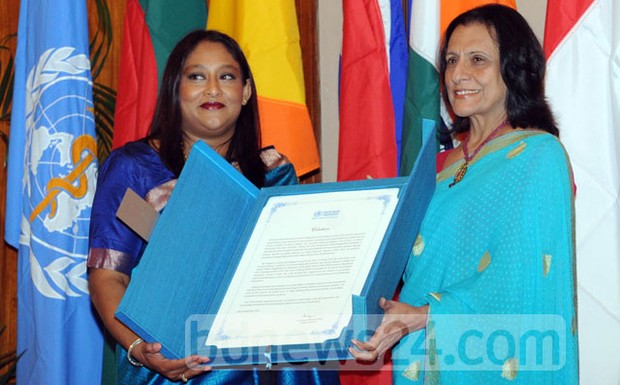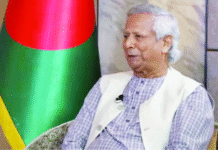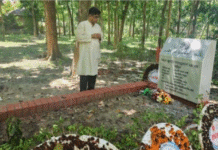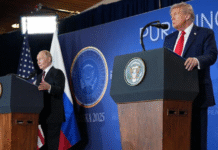Saima Wazed Hossain has made ‘a great mark’ with her works on autism to put the neuro-development disorder on the World Health Organisation’s map, the UN agency says.
Its South-East Asia Regional Office (SEARO) chief handed her the WHO Excellence Award for Public Health at an event at Pan Pacific Sonargaon Hotel in Dhaka on Wednesday.
This award is in recognition of her contribution to public health in the ‘national, regional and global level’.
Saima Wazed Hossain, better known by her nickname Putul in Bangladesh, is the daughter of Prime Minister Sheikh Hasina, who was present at the event as ‘mother’.
A humbled Putul in an immediate reaction dedicated the award to the families of the children living with autism.
“It’s my duty to work for mental health,” the US-licenced school psychologist said.
She is among the first two recipients of the newly instituted award.
The National Malaria Control Programme (NMCP) of Timor-Leste is the other recipient of the award in institutional category.
Timor-Leste health minister Sergio GC Lobo received the award on behalf of the programme.
SEARO Regional Director Poonam Khetrapal Singh handed them citation and crests.
In the citation note, the WHO says Putul made a “path-breaking” role on autism at national, regional and global level to ensure there is a national policy and commitment for the autistic children.
Putul is the Chairperson of the Bangladesh’s National Advisory Committee on Autism and Neuro-developmental Disorders, and Global Autism Public Health Initiative – Bangladesh.
She is the architect of South Asia Autism Network that brought the regional countries together to address the growing challenge of this disorder.
It was at her initiative that Bangladesh hosted the first-ever global conference on autism in 2011, drawing leaders like India’s Congress Party chief Sonia Gandhi.
She later also moved a proposal on autism in the WHO on behalf of Bangladesh.
The proposal was accepted this year by the World Health Assembly.
Before this resolution, due to her initiative the UN and WHO South East Asia Region have adopted two separate resolutions on autism that were moved by Bangladesh.
Regional Director Singh announcing her name said she made a great mark with her works on autism which had not been in the WHO map before.
“…today we have resolution in the WHO and also in our regional committee,” she said.
In the citation the WHO said she had initiated her campaign primarily nationally, then regionally and globally on autism spectrum disorder (ASD) which had gathered momentum and brought the children affected by the ASD to the attention of health policymakers.
Going beyond autism, the citation, which a WHO director read out, says her campaign covers children and families affected by other mental health disorder including childhood development disorder.
It says her work extends beyond health sector to build “multi-disciplinary and multi-stakeholder partnerships”.
WHO acknowledged her efforts deeply appreciating her “outstanding contribution in ASD”.
In her immediate reaction, Putul said she felt “very honoured and humbled” to have received such recognition “for my small efforts”.
She said being a psychologist it was her duty to work in the field.
“Autism just happens to be my favourite one,” she said mentioning the plight of autistic children and their families who cry in silence, particularly in this region due to high stigma.
She termed it a “most challenging disorder” as autistic children cannot advocate by themselves for their need like people with many other disabilities.
Autistic children are unable to pick up self-care tasks – dressing, self-feeding, toileting – by watching and imitating. They cannot make eye-to-eye contact, and have a single-track thought process.
The problem usually begins to show up in the first three years of life, affecting the normal development of social and communication skills. No one can say why, but the trend is rising
Putul said her work was also because of the “enormous public health challenges” with the ever-increasing number of autistic children.
She, once again, called for collaboration among countries as she said Asian countries “lack resources and expertise”.
It would only be possible to develop and deliver “innovative solution” for those special kids when everyone collaborated and shared best practices.
She said the award was “not simply acknowledgment of my efforts, but recognition of struggle of all those affected by autism and their families”.
“It’s an indication that WHO understands the need of addressing autism.”
Putul thanked all for supporting her and particularly mentioned her loved ones.
She first named her aunt Sheikh Rehana who she said “lived with me, encouraged me and pushed me forward” and then her “wonderful” husband and four “beautiful” children.
Hasina got off her chair, walked up to her and embraced her daughter when Putul alighted from the stage.
Senior ministers including Abul Maal Abdul Muhith, Amir Hossain Amu, and Tofail Ahmed also congratulated her there.
Bangladesh, Bhutan, India, Indonesia, Maldives, Myanmar, North Korea, Nepal, Sri Lanka, Thailand, and Timor-Leste are the members of the WHO South-East Asia region.
The regional director said they had introduced the award “to have healthy competition among those who devote themselves for public health”.
Source: Bd news24










